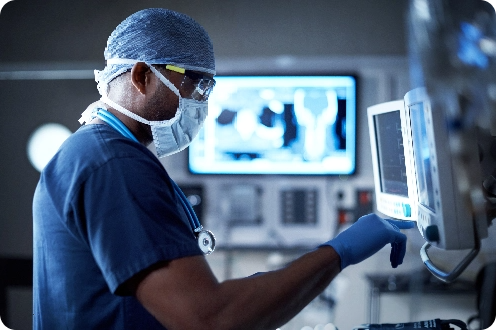Mechanical and Circulatory Support
As a premier heart diagnostic, treatment and research facility, Baptist Heart Institute is the region’s largest, most comprehensive provider of mechanical and circulatory support devices and therapies such as LVADs, ECMO, CentriMag™, intra-aortic balloon pumps and Impella®.

Left Ventricular Assistance Devices
We provide evaluations for left ventricular assistance devices (LVADs) as a destination therapy or as a short- or long-term transition therapy (also known as bridge therapy) to a future heart transplant. An LVAD is a battery-operated, mechanical pump for patients who have reached end-stage heart failure. The device is surgically implanted just below the heart to help the left ventricle, the main pumping chamber of the heart, move blood to the rest of the body. A control unit and battery pack are worn outside the body.
The LVAD doesn't replace the heart. It helps maintain the pumping ability of a heart that is too weak to work on its own. This can mean the difference between life and death for a person whose heart needs a rest after open-heart surgery or for people waiting for a heart transplant. Patients who receive an LVAD often experience less fatigue, more strength, and better breathing, as well as longer survival.
Extracorporeal Membrane Oxygenation
Extracorporeal Membrane Oxygenation, known as ECMO, is a process by which blood is pumped outside the body into a machine that removes carbon dioxide and returns oxygen-rich blood back into the body. Baptist Heart Institute acquired a number of ECMO machines during the height of the COVID pandemic to provide this life-saving therapy to patients who had exhausted all other treatments.
Baptist Hearth Institute also uses ECMO as a transition therapy for patients with advanced heart failure or disease waiting for a transplant of a new heart and/or lungs.
CentriMag™ (CMAG)
For temporary ventricular support, a CMAG is used for patients who fail to come off cardiopulmonary bypass or as a bridge to allow medical staff to decide on the best options for long term support. It can provide over nine liters of blood flow to the heart and can be used for 30 days or more.
Intra-aortic balloon pump (IABP)
Using a balloon placed in the aorta through the axillary or femoral artery, this device decreases oxygen demand on the heart and increases oxygen supply. It is a short term mechanical device that is typically inserted through the groin and helps the heart pump blood to the body more efficiently and supply blood to the blood vessels in the heart.
Impella®
An Impella is used for temporary ventricular support in patients with depressed heart function. Typically inserted through the groin, this short-term mechanical device provides more support than an IABP. This device can also stay in place longer than an IABP, if needed. It is mostly used in high-risk heart catheterizations to provide support when placing stents in critical vessels.


